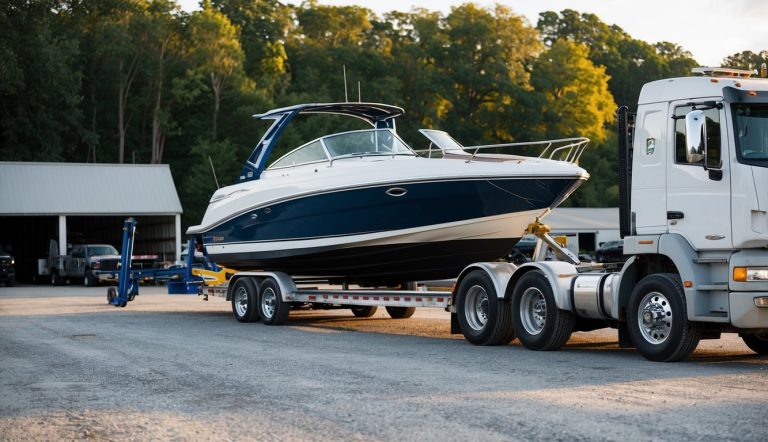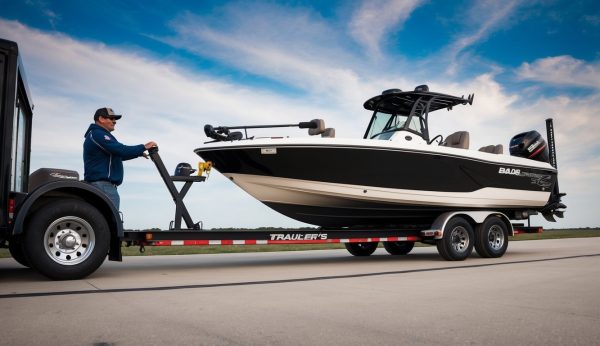Boat hauling services provide specialized transportation for various watercraft, including speed boats. These professionals ensure your vessel travels safely from one location to another while protecting it from road hazards and environmental damage.
Defining Boat Hauler Responsibilities
- Boat haulers take on several important duties when transporting your vessel. They secure your speed boat properly on specialized trailers using appropriate straps and supports to prevent shifting during transit.
- Professional haulers handle all transportation permits required for oversized loads, which saves you time and potential legal issues. They also plan optimal routes that avoid low bridges, narrow roads, and other obstacles.
- Insurance coverage is another critical responsibility. Reputable haulers maintain comprehensive insurance that protects your vessel during the entire transportation process.
- Most importantly, boat haulers have the expertise to load and unload your speed boat safely, minimizing the risk of damage during these critical moments. They use specialized equipment and techniques that amateur transporters typically lack.
Types of Boat Haulers
When looking to find boat haulers near you, it’s important to understand the different types available:
Independent Haulers: These are individual transporters with their own equipment who often offer competitive rates. They typically handle smaller vessels and provide personalized service.
Transport Companies: Larger businesses with fleets of trucks and specialized equipment can handle boats of all sizes. They usually have:
- Established safety protocols
- Tracking systems
- Customer service departments
Marketplace Platforms: Online services that connect boat owners with verified transporters, allowing you to compare quotes and reviews before choosing.
Some haulers specialize in specific boat types or distances:
- Local transporters (within 100 miles)
- Regional haulers (within state boundaries)
- Long-distance transporters (nationwide shipping)
The right choice depends on your speed boat’s size, required distance, and budget constraints.
Criteria for Selecting a Speed Boat Hauler
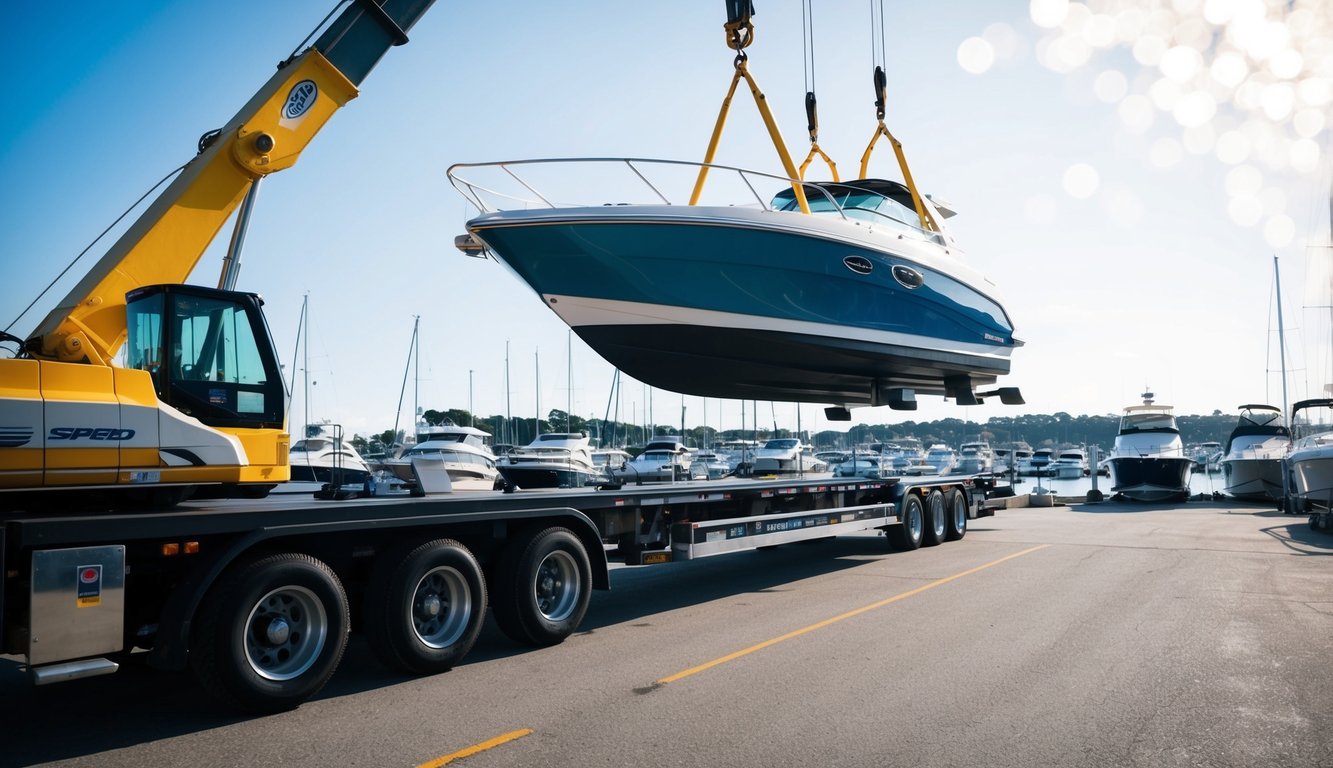
Finding the right professional to transport your speed boat requires careful evaluation of several key factors. The hauler you choose will be responsible for safely moving your valuable watercraft, so making an informed decision is essential.
Assessing Hauler Expertise and Reputation
- Start by examining the hauler’s experience with speed boats specifically. Look for companies that have handled watercraft similar to yours in size, weight, and value. A hauler with specific speed boat transportation expertise will understand the unique challenges involved.
- Check online reviews and ratings on multiple platforms. Past customers often share detailed experiences that can reveal a company’s reliability and professionalism. You can also request references directly from the hauler.
- Industry certifications and memberships in professional associations are strong indicators of credibility. These credentials show the hauler’s commitment to industry standards and continuous improvement.
- Ask about their track record for on-time deliveries and how they handle delays. Reliable haulers maintain clear communication throughout the transportation process and have contingency plans for unexpected situations.
Evaluating Equipment and Transportation Means
Inspect the hauler’s equipment quality and suitability for your speed boat. Professional boat haulers should have specialized trailers with proper support systems designed for watercraft transport. The hauling vehicle should be adequately powered for your boat’s weight. Ask about the truck specifications and how they match up with your vessel’s requirements.
Verify that the company uses appropriate securing methods:
- Proper tie-downs and straps
- Hull support systems
- Protective coverings for transit
Request information about their transport planning process. Professional haulers carefully map routes to avoid low bridges, narrow roads, and other potential obstacles. Modern tracking technology is a plus. Some haulers offer GPS tracking so you can monitor your boat’s journey in real-time.
Safety Standards and Insurance Considerations
- Insurance coverage is non-negotiable when selecting a boat hauler. Verify that the company carries adequate cargo insurance specifically covering boat transportation.
- Request proof of their liability insurance policy and understand exactly what’s covered. Ask about their claims process and how damages are handled if they occur during transit.
- Inquire about the hauler’s safety record and accident history. Reputable companies maintain detailed maintenance logs for their equipment and follow strict safety protocols.
- Check if the hauler complies with Department of Transportation regulations. Legitimate transporters have DOT numbers and follow federal safety guidelines.
- Ask about their loading and unloading procedures. Professional haulers use specialized equipment and techniques to safely move your speed boat on and off the trailer, minimizing risk of damage.
Specifics for Speed Boat Hauling
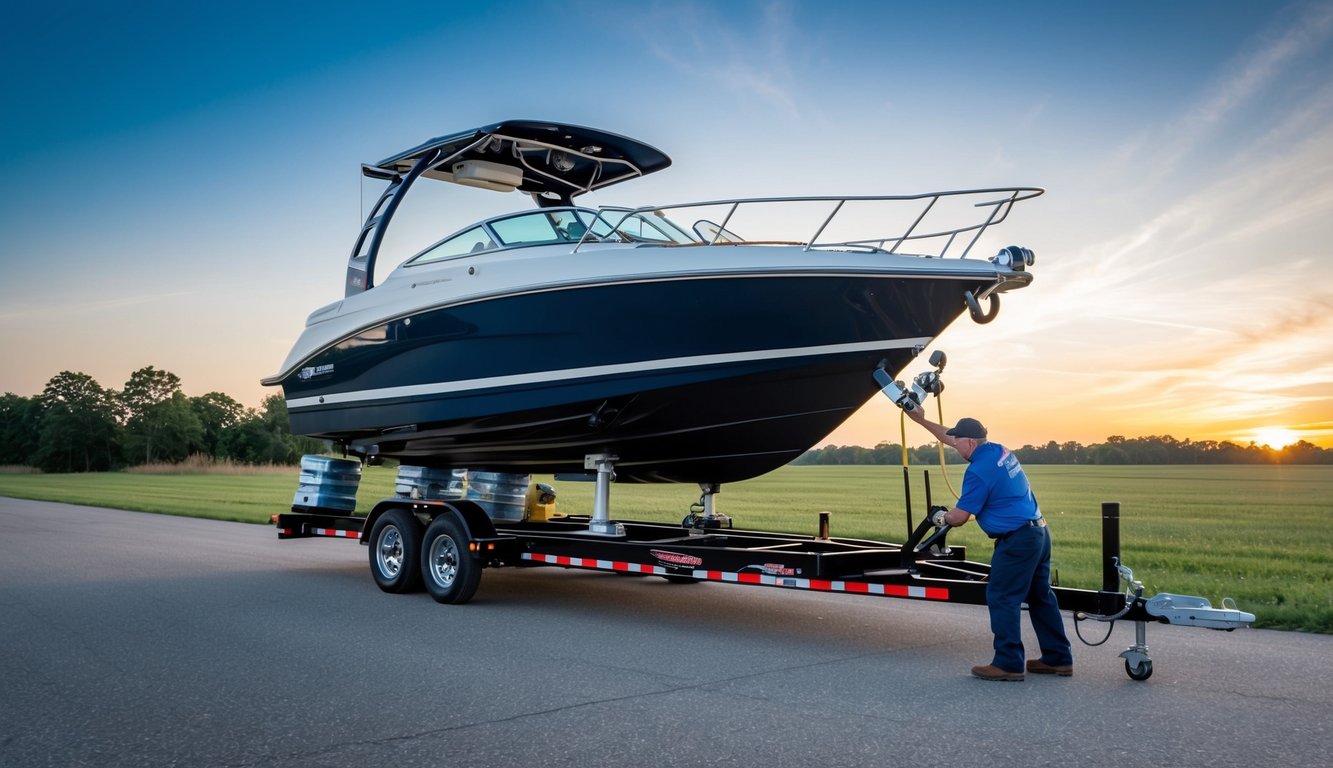
Transporting speed boats requires special attention to their unique characteristics and handling requirements. Speed boats have specific design features that impact how they should be transported.
Understanding Speed Boat Dimensions
Speed boats typically range from 16 to 30 feet in length with varying widths. Most speedboats can be transported on standard trailers, but those wider than 12 feet require special permits and equipment. The lightweight design of speed boats, often featuring all-welded aluminum construction, makes them easier to transport than heavier vessels. However, this lighter weight can make them more susceptible to damage during transit.
When measuring your speed boat for transport, include:
- Overall length (bow to stern)
- Beam width (widest point)
- Height (including windshield and towers)
- Weight (dry weight plus equipment)
Transport companies use these measurements to determine the right trailer configuration and secure proper permits. Most standard speed boats stay under width restrictions, but high-performance models may require specialized handling.
Special Requirements for High-Performance Boats
High-performance speed boats need extra care during transport due to their specialized components and aerodynamic design. These boats can reach speeds over 100 mph and feature delicate equipment that demands proper protection.
Professional boat hauling services use specialized equipment for high-performance vessels, including:
- Custom-fitted transport covers
- Extra tie-down points
- Padded supports for hulls
- Protective wrapping for sensitive components
You should remove or secure all detachable parts like GPS units and expensive electronics before transport. The fuel tank should be no more than 1/4 full to reduce weight and risk. For boats with custom paint jobs or graphics, request additional protective wrapping. Many transporters offer specialized insurance options for high-value speed boats to protect your investment during the journey.
Finding the Right Hauler Near You
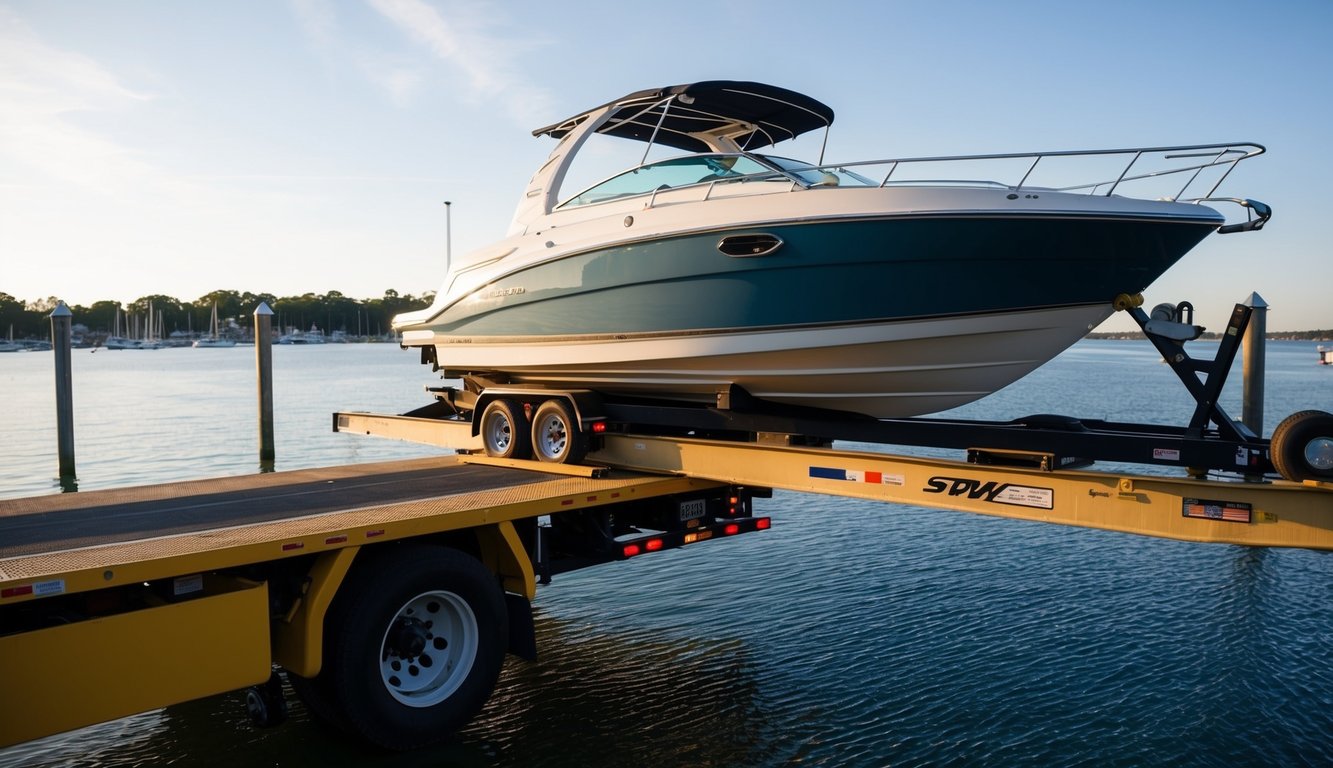
When it’s time to move your speed boat, finding a reliable hauler is crucial. The right boat transport company will ensure your vessel arrives safely and on time. To find boat haulers in your area, start by searching online directories. Websites like CitizenShipper offer services to connect you with transporters near your location. Ask for recommendations from fellow boat owners. Your local marina or boat club can be excellent sources for trusted hauler referrals.
Check credentials carefully. Make sure any potential hauler has:
- Proper licensing
- Insurance coverage
- Experience with speed boats
- Positive customer reviews
Get quotes from multiple companies to compare pricing. Don’t focus solely on price. The cheapest option isn’t always the best for your valuable vessel. Consider the hauler’s reputation and experience with boats similar to yours. Request proof of insurance before making your decision. Your boat should be fully covered during transport to protect your investment.
Look for companies with specialized equipment for speed boats. Proper trailers and securing methods are essential for safe transport. Reading customer reviews can provide valuable insights. Look for feedback about timeliness, communication, and how carefully they handled boats.
